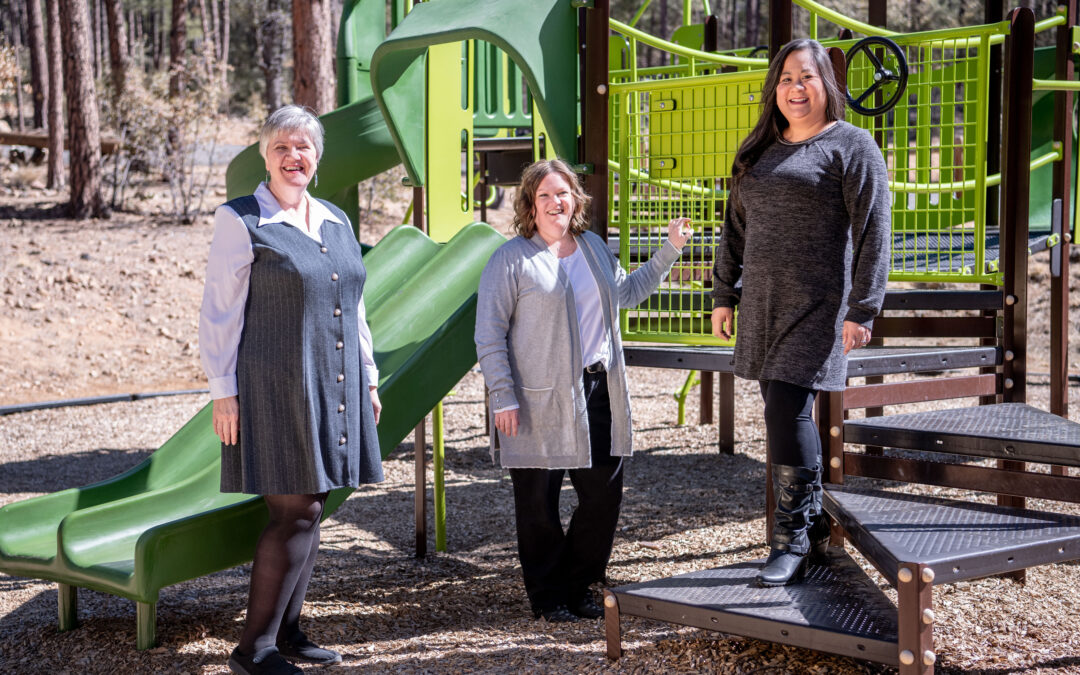Giving babies, toddlers, and preschoolers what they need to be healthy and successful
The first five years of a child’s life are critically important in terms of brain development and the development of social skills that enhance success in school and throughout life, according to Kathy Watson, chair of First Things First (FTF), Arizona’s early childhood agency.
FTF funds early learning, family support, and children’s preventive health services to help kids be successful once they enter kindergarten.
Lisa Blyth, FTF’s Regional Director, said that the agency “works in the true role of prevention [within families] focusing on building strong families in order to create resilient children who can be successful in school and throughout their lives.”
To that end, FTF uses various methods—scholarships for children to attend high-quality preschools and childcare centers, professional development for early childhood professionals, and funding to provide training, seminars, and support to parents and professionals working with young children—to support the more than 12,500 children under 6 in the FTF Yavapai Region (which covers all of Yavapai County, the part of Sedona that lies in Coconino County, and the Yavapai-Apache Nation).
Another important method: home visits, during which trained parent educators to visit a family’s home to support and empower families and children experiencing various challenges (to learn more, read First Things First Home Visits: Empowering Families to Thrive, below).
Lynda Bennett, Community Outreach Coordinator, said, “What First Things First is not doing, is patching a Band-Aid on the problem. We are looking at the community system and how to change it overall.”
Lynda, a local to the Yavapai area, laughs about the way her role with FTF was one she never saw coming but knows that it has brought her full circle in the area that raised her. “I get to look at what builds strong communities and that starts with tiny humans. I know that through First Things First I am making a difference in an area I care deeply about.”
“What happens in early childhood can and will make a difference in a child’s life. It’s why I do what I do, and I couldn’t imagine doing anything else,” said K Vilay, Senior Regional Director, of the role FTF plays.
As parenting experts often tell parents who are expecting a baby: it doesn’t matter if it’s the first or third, every new baby makes you a new parent. First Things First, Arizona’s early childhood agency, is there to help.
For more information on programs available in your community visit www.FirstThingsFirst.org
First Things First Home Visits: Empowering Families to Thrive
One of the strategies First Things First employs to support and empower families and young children is home visits, in which trained parent educators support and empower families and children experiencing various challenges, and support the bonding between the parents and child. These visits also include screenings to detect vision, hearing and developmental issues to prevent learning challenges later on.
For Jacqueline Nordlander, who lives in Chino Valley, the home visitation program was a lifeline after she gave birth to premature twins.
“I didn’t know what to do,” Nordlander said, recalling her feelings while she was pregnant. “When they came two months premature with some major health challenges, I was overwhelmed.”
A parent educator from FTF worked with Nordlander to track her sons’ development and determine whether they were meeting typical milestones.
For the first two years of a premature baby’s life, development is measured at a child’s corrected age — the age they would be if born on their original due date. So, to accurately track the boys’ development, the young mother had to calculate the corrected age and look at the typical development of babies two months younger than they were.
“I didn’t know anything about milestones before,” Nordlander said. The parent educator “helped me teach the boys how to roll over and how to work on their fine motor skills like picking small things up or putting objects inside of something. The support I received from the First Things First-funded home visitation programs made all the difference.”
The boys, who are now in elementary school, were ready when they started kindergarten. “I still have the books I received and I can go back to review the information I learned any time I want to be sure I’m doing all I can to help my children be strong and healthy,” she said.

